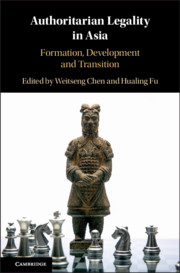Book contents
- Authoritarian Legality in Asia
- Authoritarian Legality in Asia
- Copyright page
- Contents
- Tables
- Notes on Contributors
- Acknowledgments
- Abbreviations
- Introduction Authoritarian Legality, the Rule of Law, and Democracy
- Part I Framework
- Part II Authoritarian Legality
- Showcase of Authoritarian Legality and Its Potential Erosion
- City Jurisdictions with a Colonial Common Law Tradition
- 5 Understanding Authoritarian Legality in Hong Kong
- 6 The Clash of Legal Cultures
- 7 Is Singapore an Authoritarian Constitutional Regime? So What If It Is?
- Ancient Power with Civil Law Foundation
- Emerging Case
- Part III Authoritarian Legality in Transition
- Index
7 - Is Singapore an Authoritarian Constitutional Regime? So What If It Is?
from City Jurisdictions with a Colonial Common Law Tradition
Published online by Cambridge University Press: 14 July 2020
- Authoritarian Legality in Asia
- Authoritarian Legality in Asia
- Copyright page
- Contents
- Tables
- Notes on Contributors
- Acknowledgments
- Abbreviations
- Introduction Authoritarian Legality, the Rule of Law, and Democracy
- Part I Framework
- Part II Authoritarian Legality
- Showcase of Authoritarian Legality and Its Potential Erosion
- City Jurisdictions with a Colonial Common Law Tradition
- 5 Understanding Authoritarian Legality in Hong Kong
- 6 The Clash of Legal Cultures
- 7 Is Singapore an Authoritarian Constitutional Regime? So What If It Is?
- Ancient Power with Civil Law Foundation
- Emerging Case
- Part III Authoritarian Legality in Transition
- Index
Summary
Scholars studying Singapore have given it many labels ranging from a dictatorship and one-party state to an illiberal democracy. In 2015, Mark Tushnet, in a much-discussed article published in the Cornell Law Review, used Singapore as the quintessential prototype of what he calls “authoritarian constitutionalism.” This chapter critically examines and unpacks Tushnet’s model of “authoritarian constitutionalism” and argues that this categorization is neither accurate nor useful. The author argues that Tushnet’s construction of this model is based on flawed premises and variables and that from the perspective of comparative constitutional law, this kind of model-making is unhelpful for scholars seeking to understand the true nature of how constitutions work in different societies.
Keywords
- Type
- Chapter
- Information
- Authoritarian Legality in AsiaFormation, Development and Transition, pp. 187 - 202Publisher: Cambridge University PressPrint publication year: 2020
- 1
- Cited by

